| Srl | Item |
| 1 |
ID:
137596
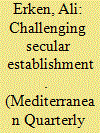

|
|
|
|
|
| Summary/Abstract |
Student movements in the twentieth century Middle East have received less attention than many other topics in the study of the region's cultural and political history. Yet the rapidly changing demographic composition of the region since the 1960s have made young people and youth activism a significant parameter in Middle Eastern politics, highlighted by the Arab Spring that began in late 2010. Student movements in Turkey and Egypt gained momentum in the 1960, and in the 1970s Islamic discourse became increasingly popular among young activists. These youth movements operated through flexible structures, allowing them to challenge the state authority and secular statecraft. This essay explores three of the leading religious and nationalist student movements in Turkey and Egypt in the 1970s.
|
|
|
|
|
|
|
|
|
|
|
|
|
|
|
|
| 2 |
ID:
105024
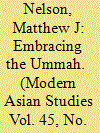

|
|
|
|
|
| Publication |
2011.
|
| Summary/Abstract |
Studies of student politics in Pakistan often focus on the competition between 'secular' and 'religious' student groups-for example, the leftward-leaning National Students Federation, regional parties with a broadly secular orientation like the Pakhtun Students Federation, the Islami Jamiat-e-Tuleba (Islamic Students Association), and sectarian groups like the (Shi'a) Imamia Students Organization. This paper describes the emergence of an increasingly violent stalemate between and amongst these groups since the 1960s. It then argues that for a growing number of students this stalemate produced a certain disenchantment with exclusionary efforts to control the 'state-based Muslim nationalism' that lay behind the formation of Pakistan itself. Seeking alternatives, these disenchanted students developed an interest in non-state-based forms of Muslim solidarity-forms that rejected the constraints of territorial Muslim nationalism in favour of transnational movements focused on the revitalization of Muslim solidarity on a truly global scale-movements like the (Deobandi) Tablighi Jama'at and the (Barelwi) Da'wat-e-Islami. Tracing this development, this paper takes up one application of Talal Asad's argument that alternative expressions of religion (and religious solidarity) are 'produced' by specific political circumstances. It also examines this formulation in the light of other theories that take an interest in the effects-indeed the potentially 'democratizing' effects-of protracted political stalemates.
|
|
|
|
|
|
|
|
|
|
|
|
|
|
|
|
| 3 |
ID:
132957
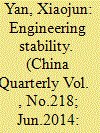

|
|
|
|
|
| Publication |
2014.
|
| Summary/Abstract |
Given their critical influence on society and politics, university students are one of the key target groups for authoritarian political control around the world. To further our understanding of the endurance and resilience of authoritarianism in post-Deng China, it is necessary to examine one of the Party-state's most crucial control frameworks: the institutional mechanism through which it preserves social stability in the nation's 2,358 university campuses, and maintains control over its more than 22 million college students. Drawing upon intensive field research conducted in 2011, this article attempts to map out the structures and measures deployed by the post-Deng regime to nurture political compliance and consolidate its domination of university campuses. By deciphering an essential component of the state's political control apparatus, this article aims to shed new light on the internal operations of the authoritarian system that is running China today.
|
|
|
|
|
|
|
|
|
|
|
|
|
|
|
|
| 4 |
ID:
146879
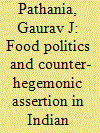

|
|
|
|
|
| Summary/Abstract |
Recently, heated debates concerning food politics have erupted at some of the most prestigious institutes of higher education in India. Students demand inclusion of beef and other meat in their hostel food menu, claiming hostel canteens represent only ‘mainstream’ Hindu culture. To boycott this culture and instil consciousness of their cosmopolitan life-world, they organise campus ‘Beef Festivals’ and publicly idolise so-called ‘demons’ of Hindu mythology. Using a Gramscian framework, this article explores the activism of marginalised students as counter-hegemonic and critically examines the ideological standpoints involved. As university spaces become significant sites to reinvent caste identities, we see that in their counter-hegemonic struggles, marginalised students employ the same tools and symbols of meat and myth as their opponents. It is argued that this strategy ultimately risks contradicting the goal of their activism and may block broader visions of an equal and just society.
|
|
|
|
|
|
|
|
|
|
|
|
|
|
|
|
| 5 |
ID:
122053
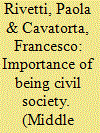

|
|
|
|
|
| Publication |
2013.
|
| Summary/Abstract |
Through a non-conventional understanding of civil society activism, the article provides an explanation of the relationship between the student movement and Khatami's governments in Iran. This study approaches 'civil society' as a space where we may observe the dynamics and exercise of power. The case study of the interactions between the Daftar-e Tahkim-e Vahdat and Khatami's governments illustrates how civil society is not a fixed concept, but a contested one. By analysing the conflicts and interactions between these two actors, the article examines the continuous negotiations that reinvent the meaning of civil society and produce political inclusion or exclusion.
|
|
|
|
|
|
|
|
|
|
|
|
|
|
|
|
| 6 |
ID:
119590
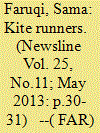

|
|
|
| 7 |
ID:
181093


|
|
|
|
|
| Summary/Abstract |
This paper aims to clarify the scope and limitations of the ideals of Pan-Maghrib nationalism as developed by the Association of North African Muslim Students in France (AEMNAF) in the 1930s. The AEMNAF members’ inclination toward sciences and technology and their emphasis on conserving their mother culture made them consider Arabism and Islam their most important identity markers. Moreover, the AEMNAF created a sense of solidarity among Maghribi students in France and extended its social influence by cooperating with French and Mashriqi opinion leaders in Europe. However, the AEMNAF's narrow definition of Muslim-ness and its elitist nature led to the exclusion of Maghribis with French citizenship from the organization. The dualistic view of technology and culture in Maghribi nationalist thought also contributed to prioritizing Francophones over Arabophones, Muslims over non-Muslims, men over women, and students in the sciences over those in humanities.
|
|
|
|
|
|
|
|
|
|
|
|
|
|
|
|
| 8 |
ID:
142751
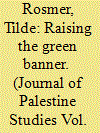

|
|
|
| 9 |
ID:
167397
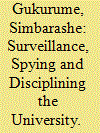

|
|
|
|
|
| Summary/Abstract |
This article examines the deployment of government spies and state security agents on a university campus in Zimbabwe and the implications this has on knowledge production at the university. The campus is presented as a socio-political space in which everyday political struggles are fought. I argue that surveillance is an intractable part of the rhythms of everyday life on campus, and a very specific form of ‘bio-power’, ‘biopolitics’ and violence meant to discipline students and lecturers, as well as the ways in which knowledge is produced and sedimented. Habitualisation of surveillance and fear of surveillance generate Foucauldian ‘panopticon’: producing ‘self-censorship’ on campus.
|
|
|
|
|
|
|
|
|
|
|
|
|
|
|
|